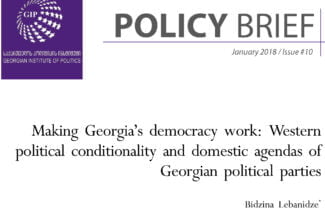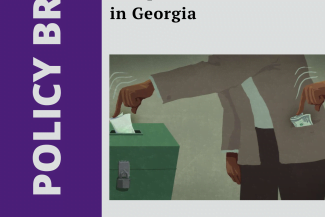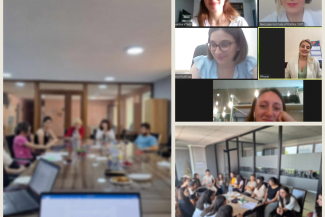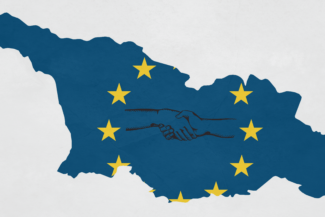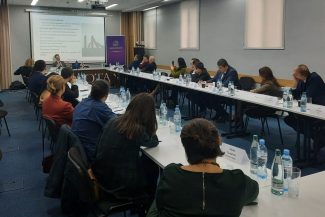Bidzina Lebanidze*
Recent public surveys have confirmed a paradoxical trend in Georgian political life: despite pressing problems, political blunders, and a troubling socio-economic situation, the ruling Georgian Dream (GD) party remains the most popular political force in Georgia. It has been almost five years now since GD first came to power, and its list of achievements remains quite short. Economic growth has slowed and Russia continues to demarcate what it considers the independent territories of South Ossetia and Abkhazia. Georgia has not made any major breakthroughs in terms of democratic and political reform, either. Instead, controversial constitutional amendments are poised to further erode checks and balances. Georgia’s democratic score has not advanced significantly in major democratic rankings.
Under such circumstances, the logic of power politics in a democratic environment would predict a decline in the ruling party’s popularity in favor of the opposition. However, GD remains the most popular force in the country and, according to the last public surveys commissioned by the National Democratic Institute (NDI), its candidate looks poised to become the mayor of Tbilisi following elections scheduled for later this year.
In light of the above, I propose six reasons why, despite many setbacks, the Georgian public still prefers GD to the opposition and is ready to tolerate its continued stay in power.
- GD managed to correct the neoliberal economic policies of its predecessor and establish a more-or-less functional social safety net. It is true that the extensive social programs come at a high price: they put immense pressure on the country’s macro-economic stability and could undermine Georgia’s long-run economic prospects. For most voters, however, the long-term economic implications of imprudent social reforms are less important than the short-term benefits from the universal healthcare system and other social programs. Moreover, the safety net adds to the feeling of social inclusion in Georgia’s socio- economic life, something that was missing during the rule of the United National Movement (UNM) with its emphasis on neoliberal market-economy reforms. GD’s socially-oriented policies may undermining the country’s economic prospects in the long-term, but they certainly contribute to a positive image of the government in the immediate term.
- GD has proven itself to be a pragmatic political player. The party did not embark on reforms that could put it at odds with the veto players within Georgian society. Rather, GD and its patron Bidzina Ivanishvili decided to coopt certain influential social groups such as the Soviet-era Georgian intelligentsia, people that Mikhail Saakashvili considered to be “flushed down” into oblivion. The aversion to painful reform is not necessarily good news for the country, but it cultivates GD’s image as a status-quo political force that doesn’t threaten the vested interests of influential groups by implementing painful reforms or withdrawing their benefits.
- GD appears less threatening to citizens than did its predecessor, UNM. The political system built by Bidzina Ivanishvili rests on weakened state institutions (exception State Security Service) and various informal cooptation mechanisms. Unlike the rule of Mikhail Saakashvili, the GD government rarely uses coercion to repress political opposition or public discontent. A combination of perceived weakness and the absence of coercive mechanisms have made GD appear less threatening and thus more acceptable to the majority of the population.
- There has been no major backsliding of the key reforms GD inherited from its predecessor. Petty corruption has not returned to Georgia. Neither have old Soviet-era institutions such as “thieves in law.” Georgia’s impartial institutions proved themselves robust enough to survive when UNM’s tight control over the state apparatus was removed. That fact has been acknowledged by the public. For instance, the Transparency International’s Corruption Perception Index has improved since the change of power in 2012. Hence, although GD lacks the drive for reform which characterized UNM, it has successfully escaped a reputation as a retrograde or reform-resistant political force. GD is not considered a spoiler of the successful state-building reforms implemented under Mikhail Saakashvili.
- GD has successfully withstood accusations by the opposition of being a pro-Russian political force. GD did abandon the confrontational manner of interaction with Russia, and trade relations between the two countries have significantly improved since it assumed power. However, GD has not abandoned Georgia’s pro-Western foreign policy course. In fact, it has accomplished important milestones on the path of European integration, including ratification of the Association Agreement and achievement of the visa-free regime. However, GD has failed to stop Russia’s “borderization” policy and there have been no breakthroughs in resolution of the territorial conflicts.
- The internal weakness of the opposition is perhaps the most important reason for GD’s continued popularity. The splitting of UNM into two separate parties did not aid pluralism in Georgia’s party system. The splinter group—the Movement for Liberty-European Georgia— seems to be successfully replicating the path of the Republican Party of Georgia, marginalizing itself and becoming politically insignificant. The remnants of UNM, on the other hand, suffer from brain drain and the long political shadow cast by Saakashvili. The other liberal opposition parties are in even worse condition. Each lack political stability, a clear vision and, most importantly, public appeal. To be sure, the majority of these parties are led by young, liberal, and pro-Western politicians. Unfortunately, however, none have the political charisma and financial resources to win the hearts and votes of Georgians. As ironic as it may sound, it seems that Saakashvili was Georgia’s only liberal pro-Western leader capable of performing a nearly-impossible balancing act of promoting liberal ideas and staying popular with the population for a sustained period of time.
In conclusion, it is a personal achievement of multibillionaire Bidzina Ivanishvili that GD remains firmly in power after five years of rule. Ivanishvili built a political system which does not rely on coercion but rather cooptation through material and political incentives. Therefore, the state appears less threatening and does not challenge the vested interests of influential veto actors. Ivanishvili has succeeded through the use of a pragmatic and Machiavellian policy mix to establish a system of oligarchic governance that remains fairly popular.



